From Prince to Megan Thee Stallion: When record contracts go wrong
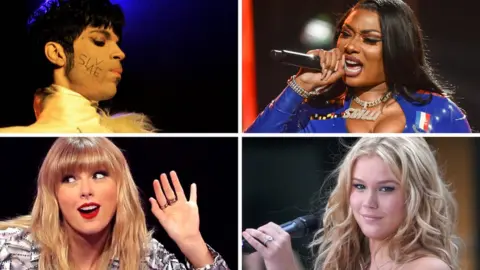 Getty Images
Getty ImagesRapper Megan Thee Stallion claims that her record label is preventing her from releasing new music.
The star, who released the platinum-selling single Hot Girl Summer last year, says she's been frozen out since asking to renegotiate her contract.
"I didn't really know what was in my contract," she explained on Instagram Live. "I was young. I was, like, 20."
"So now they telling [me] that [I] can't drop no music. It's really just a greedy game," she added.
The musician, whose real name is Megan Pete, signed her deal with 1501 Entertainment in 2018. She only became aware of problems with the contract last year when she hired a new management team.
"It's not that I literally didn't read [the contract]," she said, "it's that I didn't understand some of the the verbiage at the time. Now that I do, I just wanted it corrected."
She has since filed court papers seeking the termination of her contract.
After the rapper issued her statement, the hashtags #FreeMeg and #FreeTheStallion started trending on social media, and other artists shared similar experiences.
"I'm not gonna put it solely down to my label situation 'cause I had other things going on," wrote British rapper Nadia Rose. "But not being able to release my music was one of the most heart wrenching feelings I've ever experienced. I had severe depression, suicidal thoughts... God, family [and] therapy saved me."
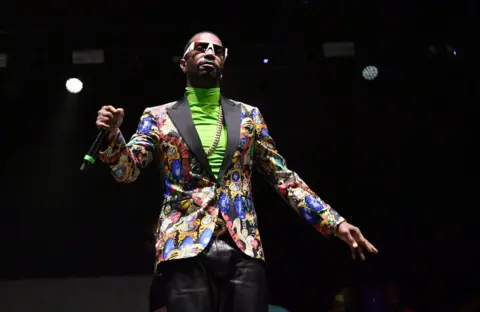 Getty Images
Getty ImagesSeparately, US star Juicy J spent the weekend arguing with his record label, fuming in one tweet: "I gave Columbia Records 20+ years of my life & they treat me like back wash. I'm gonna leak my whole album, stay tuned."
Minutes later, the star released a short, venomous track (the title of which is unprintable here) saying he was being treated like a "slave".
"If I waited on Columbia, then I'd be out here broke," he rapped. "I sold albums, sold out tours but I never sold my soul."
The track ended with a sample of Prince's acceptance speech for Artist Of The Decade at the 2000 Soul Train Awards, where he spoke about his own battle against Warner Bros Records.
"As long as you're signed to a contract, you will take a minority share of the winnings," he warned his fellow musicians.
Juicy J's song had an almost immediate impact. By the end of the day, the rapper had removed his song from streaming services and posted a conciliatory message on Twitter: "Spoke to @ColumbiaRecords. We are all good!"
Megan, Nadia and Juicy J are not alone. The record industry has a long and reprehensible history of treating artists badly, from skimping on royalty payments to binding them to unfair contracts.
In the UK, the Musicians Union now offers a standard contract to help bands avoid being exploited. But if it's too late for that, here are some of the creative ways artists have extricated themselves from bad deals.

1) Van Morrison's contractual obligation album
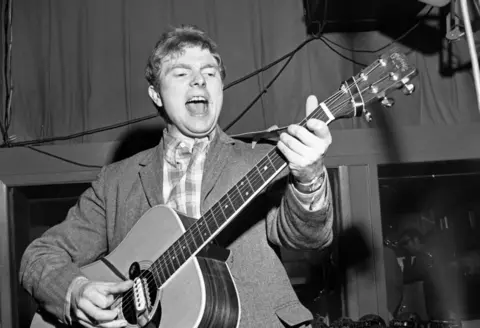 Getty Images
Getty ImagesOne day in 1967, Van Morrison walked into a recording studio in New York and recorded 31 songs. All of them were awful - but that was precisely the point.
The star had become frustrated by his label, Bang Records, who wanted more pop hits in the vein of Brown Eyed Girl; while he was being drawn towards the more mystical, jazz-inspired sounds that inspired his 1968 album Astral Weeks.
Morrison's contract stipulated that he owed Bang Records exactly 36 songs; so the famously truculent star decided to record them all in one go. The results are short, improvised and angry, with Morrison's guitar slowly going out of tune as the sessions progress.
The lyrics are bizarre. "I can see by the look on your face / That you've got ring worm," he sings on Ring Worm. "Do you want a Danish?" he inquires on Want A Danish. "No thanks, I just ate".
The tactic didn't quite work, however. Morrison's songs went unreleased until 2017. He finally got out of the Bang Record contract when the owner, Bert Berns, died of a heart attack.
There's a superbly detailed article about the sessions on longreads.com.
Allow Google YouTube content?

2) TLC take their record label boss hostage
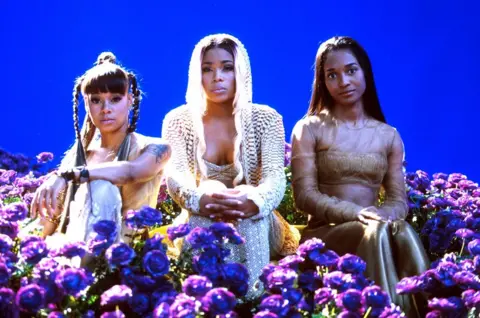 Getty Images
Getty ImagesUntil the Spice Girls came along, TLC were the biggest-selling girl band of all time. But despite selling 65 million records, they were only making $75,000 apiece.
This was mainly due to a contract the band members signed with manager Perri "Pebbles" Reid, which gave her ownership of the name, a percentage of their publishing, and a share of every dollar the band ever made.
Frustrated, the band decided to take action - storming the offices of their record label, Arista, and holding president Clive Davis hostage at gunpoint.
"We were hot, because we didn't understand how we were selling all these records with nothing to show for it. So it was like, 'Alright, let's just go to the source,'" singer Rozanda "Chilli" Thomas told the BBC last year.
For back-up, they brought along a gang of women that rapper Lisa "Left Eye" Lopes had met in rehab.
"These were big girls, huge and scary," recalled Thomas. "And unless we gave them the nod, no-one could come in or out, no matter who it was."
The stand-off was eventually resolved peacefully and the group re-negotiated their contracts.
"We were some little gangsters," laughed Chilli as she recalled the incident. "TLC is as close as you get to rock and roll".

3) Frank Ocean plays a seven year chess game
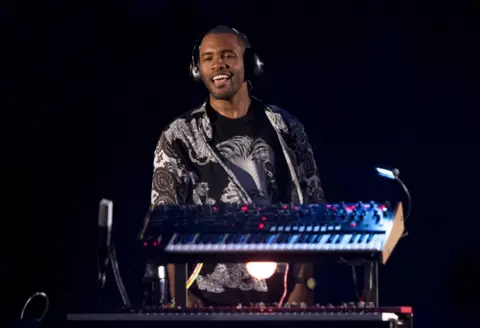 Getty Images
Getty ImagesAfter Frank Ocean signed to Def Jam Records in 2009, he found himself in limbo. The label wouldn't release his music because he didn't have a big enough profile - but he couldn't build a profile when no-one could hear him.
Eventually, he took matters into his own hands, self-financing and self-releasing the mixtape Nostalgia, Ultra. The buzz around that record prompted Def Jam to get behind the star's debut, Channel Orange, which was nominated for best album at the 2013 Grammys.
Instead of celebrating, Ocean put a cunning plan into action - severing ties with his management, his legal team and his publicist, and using his new wealth to purchase all of his master recordings and buy himself out of his contract.
As a condition of the arrangement, Def Jam were given distribution rights to his next album, Endless. But Ocean insisted it could only be released as a streaming video on Apple Music, denting the label's ability to profit from the record.
Then, the day after it came out, Frank put out Blonde - Channel Orange's official follow-up - a superior record, whose existence was completely hidden from his former label.
Speaking to the New York Times, Ocean described the release as the final move in "a seven-year chess game".

4) Stone Roses "redecorate" their record label
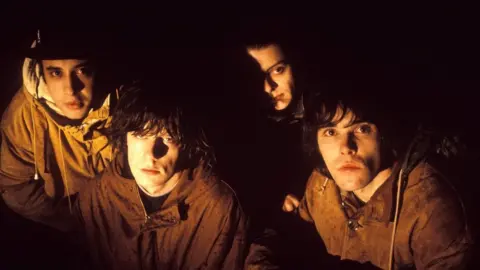 Getty Images
Getty ImagesWhen the Stone Roses released their debut album in May 1989, it almost instantly became a classic. But as their star rose and fans clamoured for more music, the band's earlier recordings began to surface.
Among them was Sally Cinnamon, a chiming, neo-psychedelic single they'd recorded for Wolverhampton's FM Revolver Records in 1987.
Seeking to cash in on the Roses' new-found fame, Revolver re-issued the song with a crudely cobbled-together video featuring slow-motion shots of pigeons and people getting their hair cut.
In the absence of the band, who hadn't consented to the video, the director instead filmed people reading an edition of The Face magazine where singer Ian Brown was the cover star.
Allow Google YouTube content?
Incensed, the Stone Roses showed up at Revolver's offices in January 1990, burst through the front door and threw five litres of blue and white paint over the label's managing director Paul Birch and his girlfriend Olivia Darling.
Not satisfied, the group then went outside and spread more paint over Birch's Mercedes, as well as two other cars. It was, as the NME reported at the time, "a right Pollocking".
The quartet received a court summons for their troubles, and were handed a hefty fine for criminal damage. But they remained unrepentant.
"I'd do it again," said Ian Brown. "I thought we were right and still do."

5) Joss Stone buys herself out of her contract
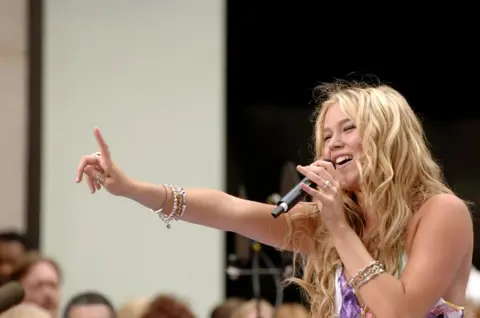 Getty Images
Getty Images"Free me, free me, EMI," sang Joss Stone on her 2009 single, Free Me, a song released by her then-record label (yes, you guessed it) EMI.
The star had grown disillusioned with her label after it was taken over by a private equity firm in 2007, saying she had "no working relationship" with the new owners.
When her fourth album flopped, she decided to cut ties with EMI. The catch? She had to pay back the advance she'd been given when she signed her contract.
"I realised, 'You two want completely different things. So just give it to each other.' They gave me my musical freedom and I gave them their money," she later told ABC News.
Although Stone has never confirmed the figure she paid, it's been put at anywhere between £2m and £7m. Whatever the amount, the singer reasoned it was a fair price to pay for her happiness.
"It is expensive, making an album with orchestras and wonderful musicians on it," she said. "But it's not millions and millions of pounds [so] this is my way of being happy."

6) Taylor Swift re-records her old songs
 Getty Images
Getty ImagesWhen Taylor Swift's old record label, Big Machine, was bought by Ariana Grande's manager Scooter Braun last June, she made no secret of her dismay.
One of Braun's on-and-off clients is Kanye West, who has tormented Swift for more than a decade, interrupting her at award shows, disparaging her in his songs and inserting a waxwork of her naked body into a music video.
Swift believes Braun encouraged and endorsed some of those actions, which is why she felt "sad and grossed out" by Braun taking control of her first six albums.
She called the deal "my worst case scenario" that "stripped me of my life's work". But then she came up with a plan: Later this year, Swift will re-record all of her old music, undercutting the value of the master tapes held by Braun and his investment company Ithaca Holdings.
In the future, if anyone wants to licence Shake It Off or Love Story for a film or advert, they'll be using the new version - owned and controlled by Swift.
She's not the first artist to airbrush their old recordings from existence. In 2005, the Sugababes re-released their album Taller In More Ways, digitally erasing Mutya Buena's vocals and adding her replacement, Amelle Berrabah.
In 2012, Jeff Lynne reconstructed 11 classic ELO tracks for a new Best Of album; claiming the originals didn't sound "the way I had always heard them in my head"; while U2 have incessantly fiddled with their undercooked 1997 album Pop, remixing and re-recording tracks from the record Bono once called "the most expensive demo session in the history of music".
"To re-record our back catalogue is a way of empowering ourselves," explained Nick Feldman of Wang Chung, who made copycat versions of their 1980s hits Everybody Have Fun Tonight and Dancehall Days.
"We can be much more selective about where these songs end up and how much we charge for them."

7) Prince swaps his name for a symbol
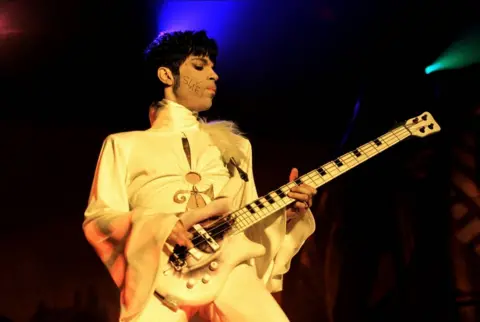 Getty Images
Getty ImagesWhen Prince signed a $100m, six-album deal with Warner Bros in 1992, it was biggest contract ever signed by a solo artist. But it came with a heavy price - Warner Bros received ownership of Prince's entire body of work.
Why did he allow this to happen? His tour manager, Alan Leeds, believed it was because Prince was eager to trump the multi million-dollar deals Janet Jackson and Madonna had recently signed.
"He was so desperate to get that headline that he was allowing his team to negotiate away certain royalties, certain publishing rights and all kinds of things to get bigger guarantees," he told the star's biographer, Matt Thorne.
As the reality of the deal dawned upon him, Warner Bros. demanded that Prince should leave more time between his album releases, fearful that the public would grow weary of his prolific output. This was like a red rag to an already irate bull.
On his 35th birthday, the star announced he would no longer go by the name Prince, but rather by a "Love Symbol" which was a mash-up of the gender symbols for man and woman.
"Warner Bros took [my] name, trademarked it, and used it as the main marketing took to promote all of the music I wrote," he said in a press release. "The company owns the name Prince and all related music marketed under Prince. I became merely a pawn used to produce more money for Warner Bros."
Allow Google YouTube content?
Of course, changing his name didn't void the contract (otherwise we'd all be doing that every time we bought a new car) but Prince's feud ran for seven years, during which time he took to writing the word "slave" on his face in eyeliner.
In the end, he fulfilled his obligations by delivering a series of throwaway albums packed with off-cuts and unfinished ideas.
Prince being Prince, of course, there are still gems to be found on those records - Papa, Dinner With Delores, Extraordinary, Gold - but ultimately he proved Warner Bros. right: Releasing so much material in such a short space of time, while removing the quality control filter, damaged his commercial prospects for years.
But Prince's fight to protect his creative rights still has repercussions today. Artists are now more likely to demand ownership of their master tapes, or to pursue alternative distribution deals - like Prince's decision to release music online or to bundle CDs with concert tickets.
No wonder Juicy J sampled him as he crossed swords with Columbia.

Follow us on Facebook, or on Twitter @BBCNewsEnts. If you have a story suggestion email [email protected].
